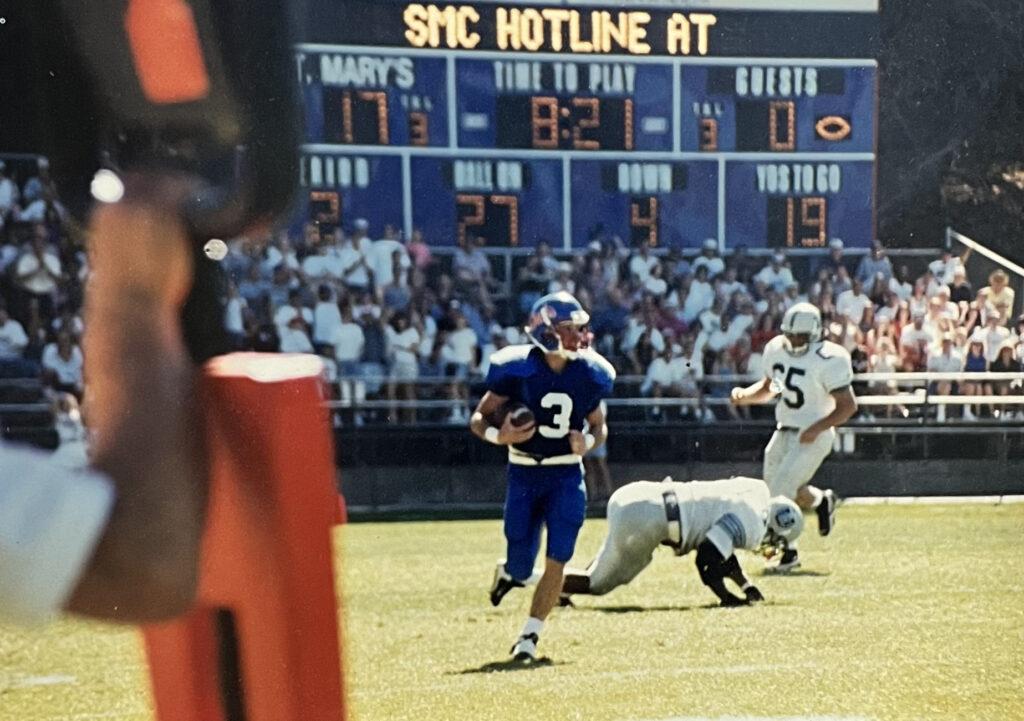Growing up, athletic director and PE teacher Rick Ellis was surrounded by passionate athletic relatives — some of his earliest memories include cheering on his uncles from the sidelines of the football field.
“I was always enamored by the look of their pads and helmet,” Ellis said. “That’s the atmosphere I was raised in. When I was little, I would wear tight pajamas and fold the socks in to look like the football players that I aspired to be like.”
His eldest uncle was the offensive coordinator at St. John Bosco High in Bellflower, a nationally acclaimed football team. At a young age, Ellis was the team’s ball boy.
“I was around to witness the football experience: the intensity on the fields, the players’ work ethics and dynamics,” he said. “It was all just incredibly influential to me.”
The powerful love for sports that Ellis was surrounded with from a young age later paved the path for him to become a standout college football player.
Inspired by his uncles and other family members, he joined the local flag football little league, La Palma Recreation. He advanced to playing for city leagues in middle school, which included playoffs throughout southern California.
Ellis found that sports always brought him joy. Having admired the high schoolers his uncle coached, he was determined to bring the same energy to help his own teammates, he said. Ellis, however, didn’t limit himself to football — he was a well-rounded multi-sport athlete who also played basketball in winter and baseball in spring.
At St. John Bosco, he made the varsity football team as a sophomore and continued to play varsity upon transferring to legendary sports powerhouse Mater Dei High in Santa Ana for his junior and senior years.
At Mater Dei, he played under longtime head coach Bruce Rollinson, who Ellis remembers to have been a source of motivation. The way Rollinson maintained a healthy atmosphere between teammates left a remarkable impact on Ellis’ high school football experience.
Ellis’s devotion to the sport paid off when he was offered an athletic scholarship to Saint. Mary’s College, a Division II and later Division 1-AA independent football program in Moraga. As Ellis participated in the NCAA West Coast Conference (WCC), football became the biggest time commitment in his life. (For budget reasons, Saint Mary’s discontinued its football program after the 2003 season, though it had been a West Coast powerhouse in the 1920s and 1930s, even winning a Cotton Bowl.)
He sat through lectures for his social studies major during the day, practiced football on the fields until 7 p.m. and studied the remainder of the night; he repeated this cycle every weekday while playing for the Gaels.
During the fall, games took place on weekends with practices five days of the week. In the off seasons, winter meant physical and technical training, while spring shifted back to a regular practice schedule.
“Playing in college was an incredible experience,” he said. “Once you get to that point, everyone’s pretty good skillswise, so it really elevates the level of performance. It was also cool to meet people from all over the U.S., and I was able to build lasting relationships. With that being said, it was definitely a grind.”
For Ellis, pushing through four years of intensive training required much perseverance and resilience, especially with football being an injury-prone and “uncomfortable sport.” During his lows, he motivated himself by appreciating the opportunities he received and pushing himself to improve his performance during games.
“You don’t get the energy, intensity and excitement of a game anywhere else. It was a dopamine kind of rush,” Ellis said. “A win was always so exciting, but even when you lose, it only makes you want to work harder.”
At the time, Ellis was 5’7” and weighed around 150 and played on the same field as towering giants who weighed in at 250 pounds or more. Although his build was not of a typical football player, he excelled as a wide receiver and punt returner with his speed and strength.
After graduating from college in 1995, he considered going professional and showed up for a few tryouts that recruited Bay Area and Northwest college athletes, for teams such as the San Francisco 49ers and the San Jose Sabercats.
Although he ultimately did not make any professional teams, the rejections guided him toward earning his teaching credential with his social studies degree.
Ellis knew he could impact the next generation of students and aspiring athletes with his knowledge as a college athlete and the influence of his own former coaches. He previously taught U.S. History and World Geography and has sometimes coached the football team here, including this year as an assistant coach working mainly with defensive backs and receivers.
Now as the school’s athletic director and track and field coach, going on 22 years, he works with students and the various sports teams’ coaches. While his college playing career as a player ended a quarter century ago, he was once again inspired by his early memories of watching his uncle coach on the sidelines.
“When I was in the credentials program, the vision to coach began to solidify,” Ellis said. “I enjoy what I do, and I haven’t looked back since.”



























